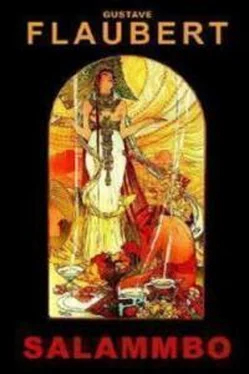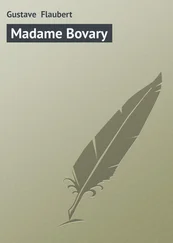Traders, scribes, workers in the arsenal, and whole families visited the Barbarians.
The soldiers allowed all the Carthaginians to come in, but by a single passage so narrow that four men abreast jostled one another in it. Spendius, standing against the barrier, had them carefully searched; facing him Matho was examining the multitude, trying to recognise some one whom he might have seen at Salammbo's palace.
The camp was like a town, so full of people and of movement was it. The two distinct crowds mingled without blending, one dressed in linen or wool, with felt caps like fir–cones, and the other clad in iron and wearing helmets. Amid serving men and itinerant vendors there moved women of all nations, as brown as ripe dates, as greenish as olives, as yellow as oranges, sold by sailors, picked out of dens, stolen from caravans, taken in the sacking of towns, women that were jaded with love so long as they were young, and plied with blows when they were old, and that died in routs on the roadsides among the baggage and the abandoned beasts of burden. The wives of the nomads had square, tawny robes of dromedary's hair swinging at their heels; musicians from Cyrenaica, wrapped in violet gauze and with painted eyebrows, sang, squatting on mats; old Negresses with hanging breasts gathered the animals' dung that was drying in the sun to light their fires; the Syracusan women had golden plates in their hair; the Lusitanians had necklaces of shells; the Gauls wore wolf skins upon their white bosoms; and sturdy children, vermin–covered, naked and uncircumcised, butted with their heads against passers–by, or came behind them like young tigers to bite their hands.
The Carthaginians walked through the camp, surprised at the quantities of things with which it was running over. The most miserable were melancholy, and the rest dissembled their anxiety.
The soldiers struck them on the shoulder, and exhorted them to be gay. As soon as they saw any one, they invited him to their amusements. If they were playing at discus, they would manage to crush his feet, or if at boxing to fracture his jaw with the very first blow. The slingers terrified the Carthaginians with their slings, the Psylli with their vipers, and the horsemen with their horses, while their victims, addicted as they were to peaceful occupations, bent their heads and tried to smile at all these outrages. Some, in order to show themselves brave, made signs that they should like to become soldiers. They were set to split wood and to curry mules. They were buckled up in armour, and rolled like casks through the streets of the camp. Then, when they were about to leave, the Mercenaries plucked out their hair with grotesque contortions.
But many, from foolishness or prejudice, innocently believed that all the Carthaginians were very rich, and they walked behind them entreating them to grant them something. They requested everything that they thought fine: a ring, a girdle, sandals, the fringe of a robe, and when the despoiled Carthaginian cried—"But I have nothing left. What do you want?" they would reply, "Your wife!" Others even said, "Your life!"
The military accounts were handed to the captains, read to the soldiers, and definitively approved. Then they claimed tents; they received them. Next the polemarchs of the Greeks demanded some of the handsome suits of armour that were manufactured at Carthage; the Great Council voted sums of money for their purchase. But it was only fair, so the horsemen pretended, that the Republic should indemnify them for their horses; one had lost three at such a siege, another, five during such a march, another, fourteen in the precipices. Stallions from Hecatompylos were offered to them, but they preferred money.
Next they demanded that they should be paid in money (in pieces of money, and not in leathern coins) for all the corn that was owing to them, and at the highest price that it had fetched during the war; so that they exacted four hundred times as much for a measure of meal as they had given for a sack of wheat. Such injustice was exasperating; but it was necessary, nevertheless, to submit.
Then the delegates from the soldiers and from the Great Council swore renewed friendship by the Genius of Carthage and the gods of the Barbarians. They exchanged excuses and caresses with oriental demonstrativeness and verbosity. Then the soldiers claimed, as a proof of friendship, the punishment of those who had estranged them from the Republic.
Their meaning, it was pretended, was not understood, and they explained themselves more clearly by saying that they must have Hanno's head.
Several times a day, they left their camp, and walked along the foot of the walls, shouting a demand that the Suffet's head should be thrown to them, and holding out their robes to receive it.
The Great Council would perhaps have given way but for a last exaction, more outrageous than the rest; they demanded maidens, chosen from illustrious families, in marriage for their chiefs. It was an idea which had emanated from Spendius, and which many thought most simple and practicable. But the assumption of their desire to mix with Punic blood made the people indignant; and they were bluntly told that they were to receive no more. Then they exclaimed that they had been deceived, and that if their pay did not arrive within three days, they would themselves go and take it in Carthage.
The bad faith of the Mercenaries was not so complete as their enemies thought. Hamilcar had made them extravagant promises, vague, it is true, but at the same time solemn and reiterated. They might have believed that when they disembarked at Carthage the town would be abandoned to them, and that they should have treasures divided among them; and when they saw that scarcely their wages would be paid, the disillusion touched their pride no less than their greed.
Had not Dionysius, Pyrrhus, Agathocles, and the generals of Alexander furnished examples of marvellous good fortune? Hercules, whom the Chanaanites confounded with the sun, was the ideal which shone on the horizon of armies. They knew that simple soldiers had worn diadems, and the echoes of crumbling empires would furnish dreams to the Gaul in his oak forest, to the Ethiopian amid his sands. But there was a nation always ready to turn courage to account; and the robber driven from his tribe, the patricide wandering on the roads, the perpetrator of sacrilege pursued by the gods, all who were starving or in despair strove to reach the port where the Carthaginian broker was recruiting soldiers. Usually the Republic kept its promises. This time, however, the eagerness of its avarice had brought it into perilous disgrace. Numidians, Libyans, the whole of Africa was about to fall upon Carthage. Only the sea was open to it, and there it met with the Romans; so that, like a man assailed by murderers, it felt death all around it.
It was quite necessary to have recourse to Gisco, and the Barbarians accepted his intervention. One morning they saw the chains of the harbour lowered, and three flat–bottomed boats passing through the canal of Taenia entered the lake.
Gisco was visible on the first at the prow. Behind him rose an enormous chest, higher than a catafalque, and furnished with rings like hanging crowns. Then appeared the legion of interpreters, with their hair dressed like sphinxes, and with parrots tattooed on their breasts. Friends and slaves followed, all without arms, and in such numbers that they shouldered one another. The three long, dangerously–loaded barges advanced amid the shouts of the onlooking army.
As soon as Gisco disembarked the soldiers ran to him. He had a sort of tribune erected with knapsacks, and declared that he should not depart before he had paid them all in full.
There was an outburst of applause, and it was a long time before he was able to speak.
Читать дальше









![Гюстав Флобер - Закат Карфагена [Сборник]](/books/414440/gyustav-flober-zakat-karfagena-sbornik-thumb.webp)
